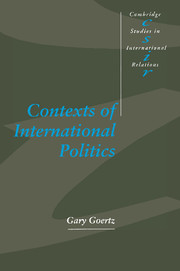Book contents
- Frontmatter
- Contents
- List of figures
- List of tables
- Acknowledgments
- 1 Introduction
- 2 Modes of context
- 3 Context as changing meaning
- 4 Contextual indicators
- 5 Rational actor and diffusion models
- 6 Barrier models of context
- 7 Oil nationalization, 1918–1980 (with Nathan Adams)
- 8 Eastern Europe, 1945–1989 (with Jon Solem)
- 9 Historical contexts
- 10 Enduring rivalries, or plus ça change …
- 11 The context of international norms
- 12 The norm of decolonization
- 13 Postface: interacting contexts and explaining contexts
- References
- Index
- CAMBRIDGE STUDIES IN INTERNATIONAL RELATIONS
10 - Enduring rivalries, or plus ça change …
Published online by Cambridge University Press: 07 May 2010
- Frontmatter
- Contents
- List of figures
- List of tables
- Acknowledgments
- 1 Introduction
- 2 Modes of context
- 3 Context as changing meaning
- 4 Contextual indicators
- 5 Rational actor and diffusion models
- 6 Barrier models of context
- 7 Oil nationalization, 1918–1980 (with Nathan Adams)
- 8 Eastern Europe, 1945–1989 (with Jon Solem)
- 9 Historical contexts
- 10 Enduring rivalries, or plus ça change …
- 11 The context of international norms
- 12 The norm of decolonization
- 13 Postface: interacting contexts and explaining contexts
- References
- Index
- CAMBRIDGE STUDIES IN INTERNATIONAL RELATIONS
Summary
[W]e should consider a bit further why organisms do not change when we all concede that their environment necessarily and inevitably does change … What really happens to organisms when environments change?
Nils Eldredge (1985, p. 136)Introduction
One island of “stability” in international politics is the long-term antagonisms between different countries. War and military conflict are rarely thought of in terms of stability, but there are pairs of countries that have repeatedly confronted each other for decades with irregular eruptions of crises and wars. The concept of enduring rivalry captures this long-term situation of more or less overt military hostility. The post-World War II era saw the US and the USSR in repeated conflict for about forty years (assuming this is now over); earlier, pairs like France–Germany and Japan–Russia were long-term rivals. Major powers have been quite involved in enduring rivalries – as in all kinds of international activities – and a large number of wars have taken place in the context of rivalries. Thus, on the face of it, the concept of enduring rivalry offers a good place to begin examining the importance of the historical context on military conflict between states.
Leng's work (1983) also leads one to suspect that the notion of enduring rivalry is of theoretical and empirical importance. Leng found that in repeated military conflict between two countries war was often the end result; war rarely broke out without preceding militarized disputes.
- Type
- Chapter
- Information
- Contexts of International Politics , pp. 196 - 222Publisher: Cambridge University PressPrint publication year: 1994



